The 13th
LaureateMusic
Ornette Coleman
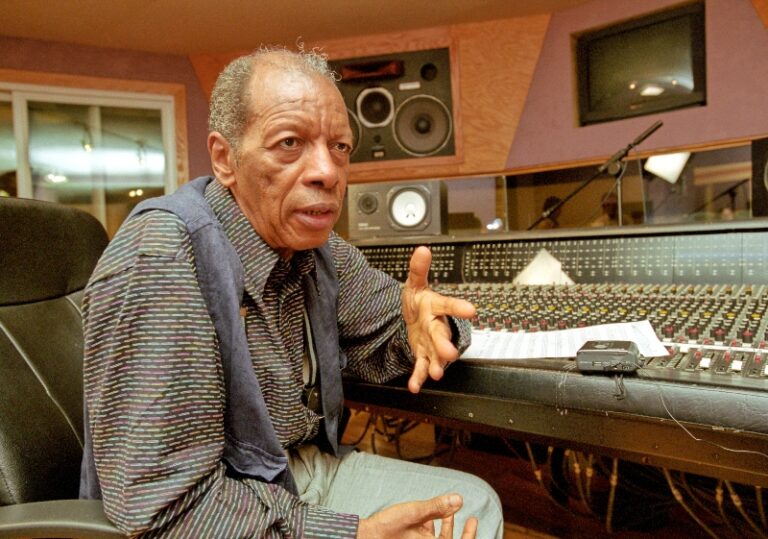
Ornette Coleman blew his way onto the jazz scene in 1959 with a band which played music in a way no-one had heard before. The music appeared to have dropped the conventions of fixed time and chord changes completely, instead allowing the musicians to engage in a kind of free expression. The approach became known as free jazz, and Ornette Coleman was universally recognised as its leader. During the later 1960s he wrote pieces which broke down the boundaries between jazz and classical music, and in the 70s he formed the band Prime Time, which is still touring and challenging musical conventions. If Coleman’s influence on other musicians was confined to the early days of free jazz alone, it would be enormous; the fact that he is still creating new agendas in music is an indication of the inspirational force he remains.
Biography
Most people think of Ornette Coleman as the revolutionary saxophonist who created free jazz, but his explorations of the musical possibilities extend much beyond that and reveal a personal musical vocabulary free from prevailing conventions of harmonic, rhythmic, and melodic structures. Coleman’s innovations, later to be known as ‘harmolodics’, pointed out a new direction, and also established his place among a group of major 20th Century American composers such as Charlie Parker, Harry Partch, Charles Ives and John Cage.
Coleman was born in Fort Worth, Texas in 1930. He bought his first saxophone at age fourteen, performed with various rhythm and blues bands, and left the city at age 19. Things changed dramatically for him in 1958 with the release of his debut album, Something Else. In 1959, his quartet made its legendary debut in Greenwich Village. The music was unlike anything ever heard before, and became the source of a well-documented controversy. Composer-conductor Leonard Bernstein, composer Virgil Thompson and numerous writers and painters heralded the impact of Coleman’s arrival.
The quartet recorded two more albums, Free Jazz and The Shape of Jazz to Come, but in the mid-sixties when Atlantic Records severed its contract, Coleman withdrew from the public eye. During this period, aside from teaching himself to play the trumpet and the violin, he wrote several string quartets, woodwind quintets and symphonic works, and helped break down the boundaries between ‘modern jazz’ and ‘serious concert’ music. In 1972, the London Philharmonic performed his Skies of America symphonic suite. The work received its New York debut, with the complete ensemble, at Lincoln Center on July 4, 1972 with the American Symphony Orchestra, conducted by Leon Thompson.
In 1975 Coleman formed his current band, Prime Time, with two guitarists, two drummers, two bassists, and Coleman on sax, violin and trumpet. He says he set up his band so that the musicians do not have to be responsible for a particular role to relate to the composition or to the melody. Prime Time’s multi-layered melodies, polytonal and polyrhythmic textures, defined by Coleman as ‘harmolodics’, continued to shape the music of the period, not only jazz. He describes harmolodics as a system that allows every person to express their own emotions and ideas regardless of their languages, instruments, or role. Around the same time, Coleman’s travels throughout Africa resulted in the release of Dancing in Your Head. In the 1980s and following years, his diverse projects again brought him to the forefront of attention. Coleman’s wide-ranging musical contributions are represented not only by the music on more than 40 albums, but also by the many musicians his vision has inspired.
Chronology
MacArthur Fellowship
-
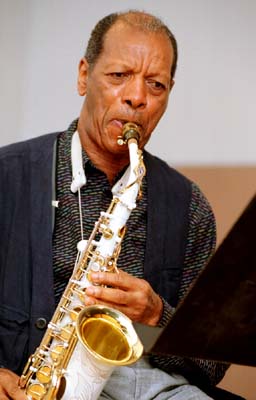
©The Sankei Shimbun, 2001
-
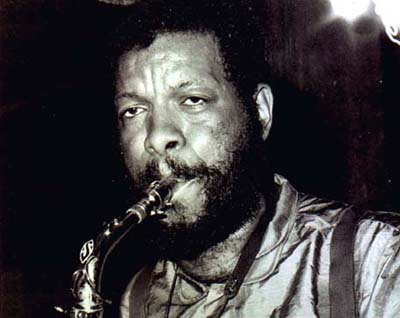
Ornette Coleman in late 1960s.
-
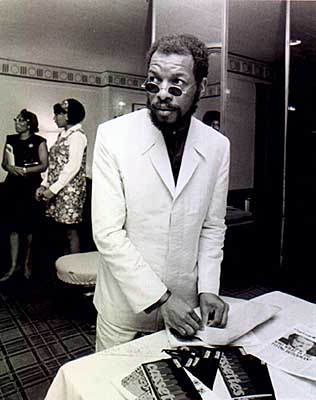
Ornette Coleman, 1966.
-
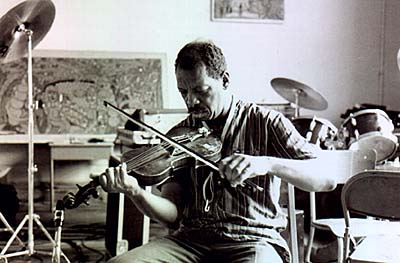
Ornette Coleman playing fiddle, 1985.
